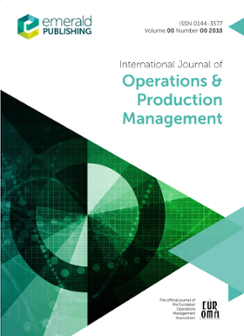提高血液安全性和可得性:供应链中的集体正念视角
IF 7.4
2区 管理学
Q1 MANAGEMENT
International Journal of Operations & Production Management
Pub Date : 2021-10-12
DOI:10.1108/ijopm-03-2021-0153
引用次数: 1
摘要
维持安全和可用的血液供应需要一个精心协调的供应链,这是世界各地卫生系统有效运作的基础。本研究探讨了血液供应链(BSC)参与者如何在其操作中展示集体正念(CM)原则,以及这些示范如何在不同的操作环境中改善血液安全和可用性(BSA)。设计/方法/方法:本研究调查了来自英国和印度尼西亚两个不同的bsc的六个案例研究,这两个案例在结构和监管上有所不同。定性数据的收集和分析采用模板分析法。这些案例揭示了供应链管理原则是如何在一系列操作条件下被证明的,以及它们对BSA的影响。与那些在更分散和松散监管的情况下相比,在更集中和严格监管的情况下,平衡计分卡参与者在更大范围的操作条件下表现出更多符合更多管理原则的行为。因此,与后一种情况相比,前者在BSA方面的改善更多。原创性/价值本文被认为是第一个在SC(相对于单个组织层面)调查CM原则的演示。它提出了一种使用行为而不是统计原理来理解和评估可靠性性能的替代方法。本文章由计算机程序翻译,如有差异,请以英文原文为准。
Improving blood safety and availability: a collective mindfulness perspective in the supply chain
PurposeMaintaining a safe and available supply of blood requires a mindfully coordinated supply chain (SC) and is fundamental to the effective operation of health systems across the world. This study investigates how blood supply chain (BSC) actors demonstrate collective mindfulness (CM) principles in their operations and how these demonstrations lead to improvements in blood safety and availability (BSA) in different operational contexts.Design/methodology/approachSix case studies drawn from two contrasting BSCs, the UK and Indonesia, which differ in structure and regulation are investigated in this research. Qualitative data are collected and analysed using template analysis.FindingsThe cases reveal how the CM principles are demonstrated in the supply chain context in a range of operational conditions and their impact on BSA. The BSC actors in the more centralised and tightly regulated cases display more behaviours consistent with more of the CM principles over a greater range of operational conditions compared to those in the more decentralised and loosely regulated cases. As such, more improvements in BSA are found in the former compared to the latter cases.Originality/valueThis paper is considered the first to investigate the demonstration of CM principles at the SC as opposed to the single organisational level. It proposes an alternative approach to understanding and evaluating reliability performance using behavioural rather than statistical principles.
求助全文
通过发布文献求助,成功后即可免费获取论文全文。
去求助
来源期刊
CiteScore
13.30
自引率
17.20%
发文量
96
期刊介绍:
The mission of the International Journal of Operations & Production Management (IJOPM) is to publish cutting-edge, innovative research with the potential to significantly advance the field of Operations and Supply Chain Management, both in theory and practice. Drawing on experiences from manufacturing and service sectors, in both private and public contexts, the journal has earned widespread respect in this complex and increasingly vital area of business management.
Methodologically, IJOPM encompasses a broad spectrum of empirically-based inquiry using suitable research frameworks, as long as they offer generic insights of substantial value to operations and supply chain management. While the journal does not categorically exclude specific empirical methodologies, it does not accept purely mathematical modeling pieces. Regardless of the chosen mode of inquiry or methods employed, the key criteria are appropriateness of methodology, clarity in the study's execution, and rigor in the application of methods. It's important to note that any contribution should explicitly contribute to theory. The journal actively encourages the use of mixed methods where appropriate and valuable for generating research insights.

 求助内容:
求助内容: 应助结果提醒方式:
应助结果提醒方式:


